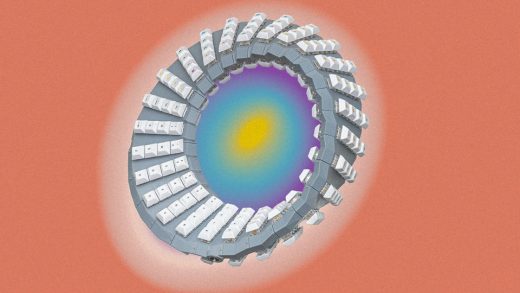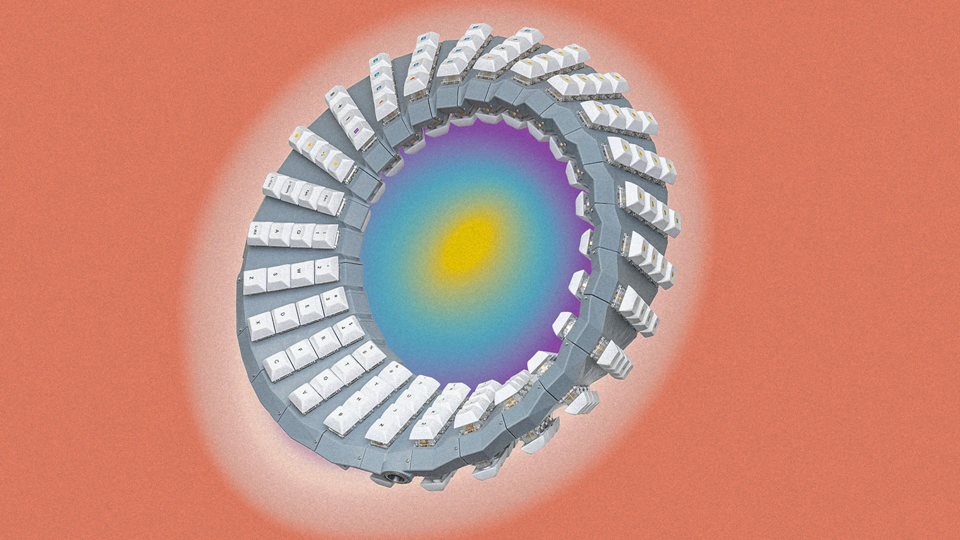Google just designed a crazy infinite donut keyboard you didn’t know you needed
Google just designed a crazy infinite donut keyboard you didn’t know you needed
Nothing brings me more joy than perfectly designed, perfectly functional, and perfectly silly gadgets. And Google Japan is the best at creating them.
BY Jesus Diaz
Google Japan has just released a new type of hardware keyboard. It calls it Gboard double-sided, aka the “Infinity Keyboard.” I call it the Krispy Kreme because it looks like a donut. The device is actually an infinite loop with keys on both sides. (Also, it’s a joke, built to promote the real software-based Gboard that you can use on Android and iPhone devices.) But even though it’s just a stunt that started as an April fool back in 2019, the keyboard actually works and you can build one yourself following the open-source schematics, 3D-printable STL files, and firmware, all available on GitHub.
The Google Japan team wanted to build a keyboard that can be used both on its front and back sides, in any position, and by multiple people—because, why the heck not? The keyboard is two-sided, following the geometry of a Möbius strip. There’s no clear top or bottom, and there’s a slant on the surface so you can actually use it with your hands in an (almost) practical way. Users can type from 360 degrees around the device, holding it in any way they want. Indeed, from the demo video, it really looks that you can type from any orientation imaginable, earning yourself instant carpal tunnel syndrome.
The USB-C Gboard double-sided specifications include 208 mechanical keys arranged in an ortholinear double-sided layout—meaning that the keys are arranged in a grid pattern, as opposed to the staggered layout typically found on keyboards. The keys are Cherry MX-compatible switches, the popular standard in mechanical keyboards favored by fans for their solid tactile feedback, durability, and distinct clickity-clack feel. Its weight, Google Japan says, is “20.8 doughnuts.” Given that the average weight of a Krispy Kreme Original Glazed Doughnut (the gold standard) is 1.7 ounces, this means the Gboard double-sided version may weigh approximately 2.2 pounds (you’re welcome). The radius is 4 inches, so you can comfortably carry it anywhere—on your head or on one of your arms—and still have two hands free to carry a cup of coffee and a real doughnut.
A Google Japan tradition
The double-sided keyboard is part of Google Japan’s history of experimental input devices, which has created a limited series of four impractical keyboards so far. On April 1, 2019, Google Japan introduced the Gboard Bending Spoon. Users selected characters by actually bending the spoon, with a sensor detecting the pressure to determine the desired letter (you can build your own with the firmware and schematics available here).
The following year, in 2020, the company released the Gboard Bar (note: it’s worth noticing the URL). This long stick keyboard featured all keys lined up in a single straight line, creating a one-dimensional QWERTY layout, with a total length of approximately 5 feet. “Designed for simplicity and collaboration,” Google Japan joked, it encouraged two users to work together by typing simultaneously, just like this new doughnut. You can download all the building specs here.
Then, the next year, on September 30, 2021, Google Japan introduced the Gboard Caps, a wearable keyboard that looked like a baseball cap(ish). With this one, you could type through head gestures. It’s probably the most surrealist and (literally) mind-bending of them all, and you can GitHub the hell out of this one, too. Enjoy the fun and the neck pain afterward.
If anything, this ongoing keyboard joke shows that there’s nobody in the world like the Japanese to create the quirkiest, most fun designs on the planet. Nobody else can compete with their imagination, but here I humbly submit, Google Japan, two final words for the next Gboard: hula hoop.
Domo arigatogozaimasu!
ABOUT THE AUTHOR
(6)



